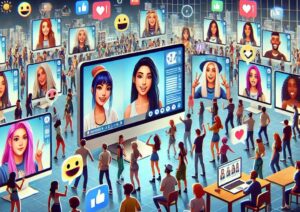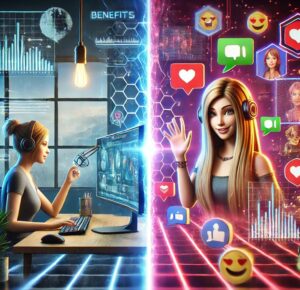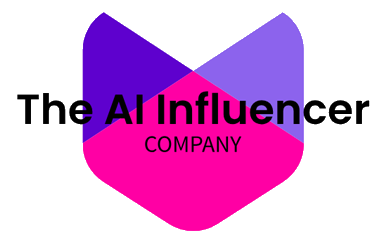The use of AI influencers on social media has been rising steadily over the past few years. At first glance, these computer-generated personas that can autonomously create content and interact with followers might seem like an exciting innovation.
However, a deeper look reveals a number of ethical concerns surrounding the use of these artificial intelligent influencers that need to be considered seriously as their popularity continues to grow.
Here we present ten of the most troubling ethical issues surrounding the use of AI influencers on social media platforms and what they do today:
1. Lack of Authenticity and Transparency
One of the biggest concerns with current AI influencer accounts is their intentional ambiguity about their artificial identity. Many of these personas are designed to appear indistinguishable from real humans.
They use computer-generated but realistic images, and they interact conversationally with others on social media. This ambiguity means many users are likely unaware they are actually engaging with an AI-powered program rather than an actual person. This lack of authenticity and transparency with users raises clear ethical issues.
Followers have a right to know if someone they believe to be a fellow human with real thoughts, emotions, and creative capacity is actually just an artificial imitation of those qualities. More transparency and disclosures are needed to avoid misleading the public.
2. Perpetuating Unrealistic Beauty Standards
The computer-generated models used for the images of many AI influencer accounts portray impossibly flawless beauty standards completely detached from reality. Their perfection only amplifies the negative impacts on self-esteem and body image issues that already stem from social media.
Presenting these unrealistic standards contributes to negative social comparisons, loss of self-confidence, disordered eating behaviors, and more among users. More humanized, diverse representations are needed.
3. Promoting Overconsumption
A major purpose of many AI influencer accounts is to serve as advertising vehicles to market products and brands. The persona engages continuously with the audience to sell goods and services.
This is done not for authentic recommendation, but for financial gain of the company controlling the account. This pattern promotes materialism and overconsumption disconnected from real needs.
Followers feel pressured to purchase goods solely for the reason that they were endorsed by the AI influencer they admire. This unethical cycle contributes to unsustainable consumerism and manipulates human vulnerabilities in the name of profit.
4. Spreading Misinformation
Unlike human influencers, AI personas have no inherent ability to research, fact-check, or reason about the truthfulness of content before sharing it. There are therefore risks of AI influencers inadvertently spreading misinformation if they are not designed with appropriate safeguards.
If users believe the AI to be human, they are likely to place greater trust in any information or opinions shared, assuming there is real understanding behind it. This can enable the rapid spread of falsehoods without accountability. More oversight mechanisms are required to prevent this outcome.
5. Lack of Accountability
Who is responsible when an AI influencer account shares something offensive, dangerous, or unethical? Perhaps the blame cannot be reasonably placed on the AI itself, but there should be accountability measures for the company or individuals that created and profited from these personas. Greater legal and regulatory frameworks will need to be established as use of AI influencers grows.
6. Data Privacy Concerns
AI influencers rely on collecting vast amounts of data about social media users to function properly. This data is used to train algorithms to tailor content and messaging to audiences. The harvesting of user data: the interests, behaviors, demographics, emotions – to inform AI influencer activities raises significant privacy issues.
Users may not be aware of how their data is used to craft manipulative messaging but there are fears about how personally sensitive data could be exploited or misused.
More rigorous data regulations around AI influencers may be warranted to protect consumer privacy.
7. Perpetuating Biases
The training datasets used for developing AI systems often contain societal biases and stereotypes reflecting historical discrimination. This means AI will learn from incidents and patterns that echo our past prejudices.
Without proactive efforts to address this, AI influencers may exhibit biased behavior that serves to reinforce prejudice and widen inequality gaps.
For example, perpetuating stereotypical gender roles or representing certain demographics in ways that propagate real-world marginalization. Ongoing auditing for fairness is essential.
8. Causing Harm to Mental Health
The filtered perfection portrayed by AI influencers sets an unrealistic standard that studies show can damage young people’s body image and self-esteem when comparing themselves to it.
Additionally, impressionable youth may develop parasocial relationships under the false belief that they are reciprocally interacting with a real friend who cares about them.
The sheer amount of time young followers in particular spend consuming the content and constantly engaging with AI influencers may become addictive and displace healthy social activities. More research is required to understand these mental health impacts.
9. Enabling Catfishing and Identity Theft
AI accounts could potentially be used for deceptive, unethical purposes beyond advertising. For example, creating a fake profile impersonating a real person without their consent to develop online relationships under false pretenses. Their use for predatory catfishing and identity theft poses troubling concerns.
Stronger identity verification processes and ongoing monitoring of activity may help mitigate some of these risks. But challenges remain for ensuring AI technology is not abused.
10. Misrepresentation and False Endorsements
Finally, the practice of AI influencers endorsing products, services or ideas they have no real opinion on raises ethical issues around misrepresentation and deception.
The essence of influencer marketing rests on the perceived genuineness and trust placed in a persona’s recommendations.
But AI systems have no lived experience to base true endorsements on – they simply promote what they are programmed to. Having artificially generated models falsely appear to enjoy products they never actually tried or believe in could erode consumer trust. More transparency around AI endorsements may help counteract this issue.
Clear disclosures around AI influencers’ inability to authentically vouch for products are important. Truth in advertising laws may require adjusting for AI systems.
Conclusion
This article examined 10 key ethical concerns surrounding the growing use of AI influencers on social media for marketing purposes. Here are the measures to address each issue:
- Lack of Authenticity and Transparency – disclose AI status
- Perpetuating Unrealistic Beauty Standards – require AI self-identification
- Promoting Overconsumption – promote consumer awareness
- Spreading Misinformation – strict data and algorithm regulations
- Lack of Accountability – establish legal and regulatory frameworks
- Data Privacy Concerns – strong cyber security
- Perpetuating Biases – rules to ensure fair competition
- Causing Harm to Mental Health – prioritize inclusive narratives over perfectionism
- Enabling Catfishing and Identity Theft – traceability and auditing
- Misrepresentation and false endorsements – transparency around limitations
To move forward responsibly, we need more conversations around developing ethical frameworks and policies guiding the use of AI influencers. With proper oversight and restraint, they could assume a productive role in marketing.
But without sufficient safeguards, their proliferation risks further eroding consumer trust and causing widespread harm. As this technology continues advancing rapidly, all stakeholders must prioritize ethics and human well-being over profits or expediency.




